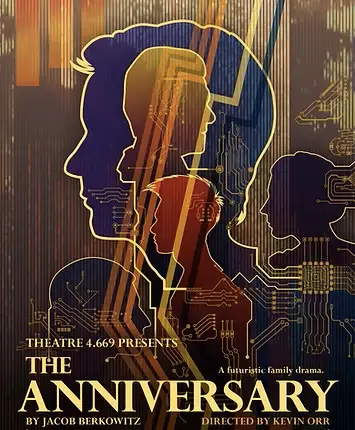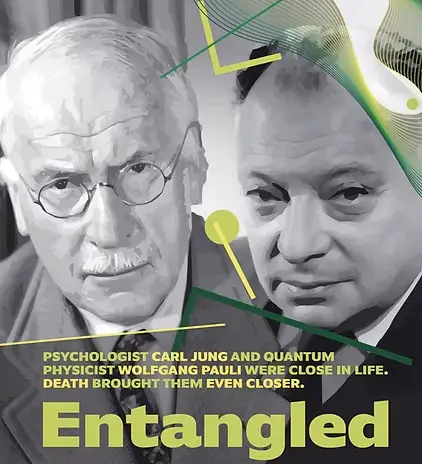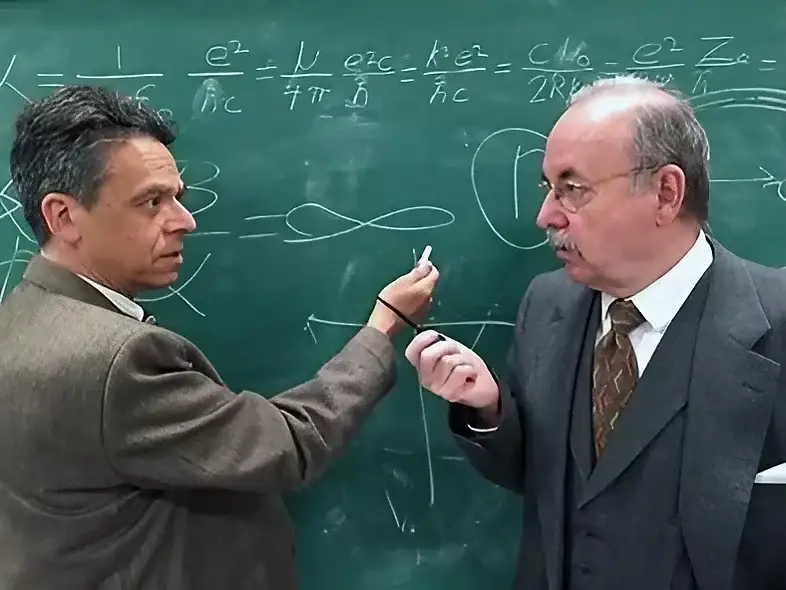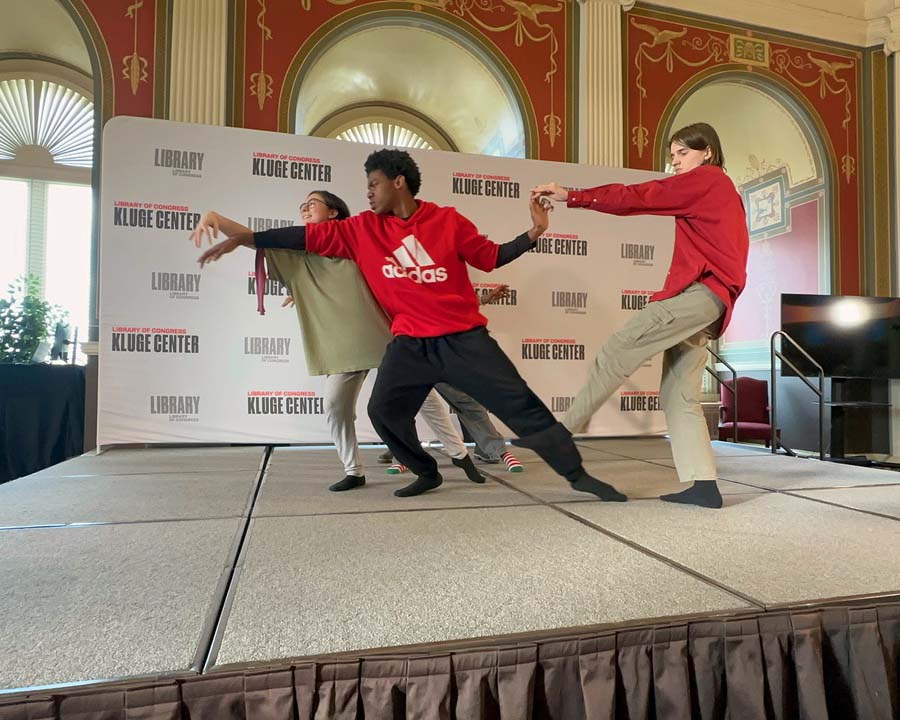Theatre
The Anniversary
Outstanding New Creation, Outstanding Production

A futuristic family drama that gets at the ancient roots of what it is to be human — or not.
Evelyn Carlyle married the perfect man and created her ideal family. But when her three adult children return home to celebrate their parents’ 30th anniversary, her creation starts to look like a failed lab experiment.
Choice, identity and the nature of connection collide in a gripping exploration of the intimate role of science and technology in our lives. How does technology shape our deepest familial relationships in ways we don’t understand or even recognize?
What does it mean to grow up in an age when technology gives us once impossible choices?

Entangled
Outstanding New Creation

On his deathbed, Nobel Prize-winning quantum physicist Wolfgang Pauli gasped one last word: Jung! It was December 1958. Pauli was finally speaking a truth that seeing death’s door called out of him – his secret friendship with pioneering psychoanalyst Carl Jung.
Entangled is about the largely unknown 25-year friendship between these two intellectual giants of the 20th century. As a play of ideas and personalities, their relationship contains enormous dramatic tension: between the head and heart; physics and the mind; truth and fiction; reason and emotion; consciousness and the unconscious.
Entangled explores the dynamic of Jung and Pauli’s complex relationship as doctor and patient, as two great intellects, as archetypal father and son and finally as that most ethereal yet powerful of connections – friends.

National Arts Centre of Canada Production
Entangled was featured as one of three physics-related plays in the NAC’s Theatre and Physics Symposium in 2021. As part of this, Entangled was produced as a radio play and streamed across Canada
Israel

An intimate solo show about finding our own land of milk and honey, and the ghosts we wrestle with to get there.
How is it that I’m sitting shiva, the Jewish period of mourning, for a grandfather who mourned my birth?
In search of an answer, Israel takes the audience on an intimate journey into the lives, loves and losses of four generations of men. The story travels from a New York’s Lower East Side in 1910, to Nazi-occupied Denmark, a botched circumcision in Jerusalem in 1964 and a failed Bar Mitzvah in small town Ontario in the 1980s. Israel powerfully combines personal narrative, oral history, and political-social commentary into an exploration of how we must travel a winding road back through thoughts, memories, feelings and relationships to finally arrive home in ourselves.
The Birth of Israel
By Jacob Berkowitz
Israel, the play, began life with another name and as a stand-up comedy routine. For anyone who knows the biblical story of Jacob/Israel that’s funny, or at least intriguing. And this has been the real story of the genesis of the play – a series of serendipitous and wonderfully echoing occurrences that guided my muse to create Israel.
Writing Israel was an act of passion. I was part of a local Almonte theatre group that was working on a collective production of which my stand-up comedy routine was to be a part. Then at one troupe meeting the plans shifted to a single-authored play. I felt myself literally shaking in my seat. I left the meeting with a headache and in a foul mood. I had a story to tell and it would be told if it needed to flip me over and whack me on the head to make me see it needed to be written.
The original concept was a stand-up routine [link to excerpt] based on my observances of the quirky nature of Canadian secular Judaism, rooted in my personal experience.
However, in the end, the play is much more likely to elicit tears than laughs.
As I workshopped bits of the initial writing with friends and the Almonte theatre group the feedback I received had one core theme: give us more of yourself. This, I soon realized, was exactly what I was trying to avoid with stand-up comedy – keep it funny and once removed. A veil of laughter and heady insight. I began the journey of editing the material to find that core storyline that listeners kept pointing to as the source of power.
It was at this time that I remembered I’d done an oral history interview with my grandfather in 1989 when he was 88-years-old. My grandmother had died months before, and with her passing and I was determined to get his story onto tape before he died.
Listening to the two-and-a-half hours of reflection and personal history 14 years after his death is an amazing experience.
When I shared it with my uncle he called me after listening to it for 20 minutes, and crying, and said he’d learned so much about his dad. Then he added that the tape would make a Pulitzer Prize-winning play (a family trait that all action must achieve the highest acclaim) along the lines of Death of a Salesman . Funny you should say that , I said, it has inspired a play .
As I re-listened several times to my grandfather’s story it elicited thoughts, memories and feelings about my relationship with him. This was the core of the narrative: my relationship with my grandfather and its role in shaping my sense of self and identity.
Ironically, what started as an exploration of Judaism – the collective experience and spirit – became a journey into the individual spirit.
I edited, forced myself to hit the delete key and eventually removed almost all of the original material from the script. Israel was indeed born second, like the biblical character, a twin born holding on to the ankle of the first born Esau. Yet it is Israel that founds the nation; the play.
Having found the core narrative line around autobiographical material, I now needed to create a coherent piece of theatre. So I began to create fictional elements to fill-out the storyline. In the end, the play is about half autobiographical, and half fictional. At least in a literal sense. However, what I’ve found is that what I remembered, or thought of as “fact” was, in numerous cases, mistaken. And the elements of fiction that emerged from my subconscious, on reflection, capture the essence of the story, and the truth , often more succinctly than the historical facts. Thus, in the end, Israel is theatre. It’s not about the facts of history or autobiography, but about the essential truths of human experience that we can all share.
Jacob Berkowitz May, 2005

Being Stardust was a unique, three-day theatrical exploration at the Library of Congress of how astrobiology facts are integrated into our collective stories and sense of self.
Four astrobiology PhD students from across the United States collaborated with of 20 sophomore theater students from the from the Baltimore School for the Arts to explore what it means to be stardust. The workshop combined the wonders of theatre and science: astrobiology presentations, theatre games, whole group brainstorming, and small group creative development.
I created and led the workshop in April, 2024 as an outreach project as the Baruch S. Blumberg NASA/Library of Congress Chair in Astrobiology, hosted at the Library’s Kluge Center.





